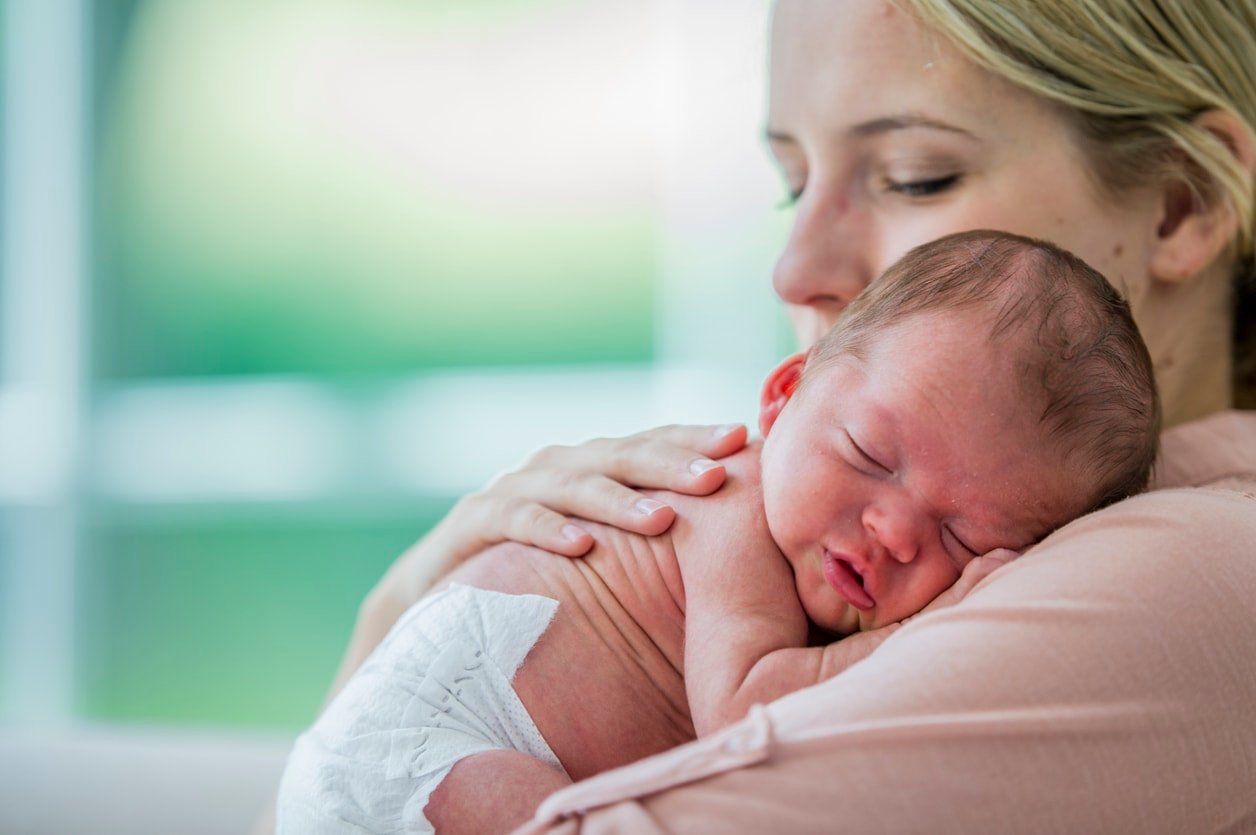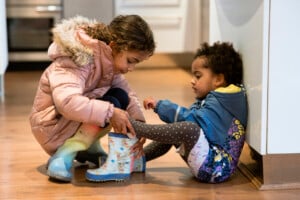After the birth of your baby, you will start to notice that they develop rapidly, from not being able to focus their eyes to tracking you as you walk around the room. Or, they may go from being unable to control their bodies to rolling around the floor at breakneck speed. But one thing most parents look forward to is that first spark of connection with their child: eye contact, cooing, recognition when you rock them, or the first real giggle when you pull a silly face. These wonderful milestones indicate that emotional development is occurring in your child. This article will share examples of the skills, key stages, and milestones to be on the lookout for and provide strategies to help boost your child’s emotional development and growth.
What Is Emotional Development?
Emotional development (sometimes interchangeably used with the term social-emotional development) is a complex task that starts in infancy and continues right up into adulthood.1 Essentially, it’s the process in which we learn how to identify feelings, understand how and why they occur, and determine what to do with those feelings (including managing or self-regulating).2 It is often coupled with social-emotional development because our emotions influence how we feel and act toward other people and situations in our lives, so this facet of development is entangled with our relationships or early attachment.2
Emotional development in children is gradual, and as babies, they can experience and understand very simple feelings (mad, sad, glad). Emotional growth occurs when the feelings get increasingly complex (jealousy, fear, disgust, etc.), and children become better equipped with the skills to explore, control, and express these different emotions.3
The Major Stages of Emotional Development
Children will develop and learn skills at slightly different rates when it comes to emotional development and growth. But while each child is unique, it’s important to know the key stages of emotional development to ensure your child is on track. While there are some commonalities between children, particular skills or behaviors typically appear at certain ages or stages of childhood. Some examples of key milestones in emotional development include:4
Newborn (Up to 3 Months)

Newborns’ facial expressions show some basic emotions — fear, happiness, and anger. They start responding to positive input like touch or your voice and may start smiling or cooing in response to you. Babies will begin to calm or settle when they are picked up or spoken to.
Infancy (3 Months to 1 Year Old)

Infants start smiling to attract your attention (not just as a reaction to your smile) and make eye contact or look for you when you call their name. They play reciprocal games like peek-a-boo or pat-a-cake and may smile and laugh in response to games, talking, and cooing. At this age, they can also react when you leave (crying or becoming distressed) and be shy around strangers or clingy to their primary caregiver. Babies at this stage can express anger, fear, and happiness and learn by modeling their parents or other caregivers.
Toddler (1 to 3 Years Old)

Toddlers can point or use interactive gestures to add information, help them communicate, or share their needs (for example, pointing to the object they want or waving to signal “bye-bye”). They may try to get caregivers engaged by showing them objects they like. At this age, they may also start moving away from you but still check that you are nearby. Toddlers often clap to show excitement and show affection by giving kisses and cuddles. This stage of development also brings about the cornerstones of empathy, as they start to notice when others are hurt (physically or emotionally) and may pause or look sad themselves. They will also look at your face and responses to see how they should react to a new situation.
Preschool (3 to 5 Years Old)

Preschoolers experience more complicated emotions, such as shame, pride, envy, jealousy, etc. They are also improving at managing their emotions. For example, they may get better at calming down when separated from their primary caregiver (like drop-offs at childcare). Preschoolers are also starting to adapt their behavior based on different environments (home versus school versus the playground). Their empathy is developing even more, and you may notice them role-playing or pretending to be different characters, like a doctor, teacher, vet, etc. (which helps build empathy down the line). They may start to comfort others if they are upset (hugging you if you are upset or sharing a toy with a sad sibling). Preschoolers can also follow simple rules and are more capable of turn-taking.
Why It’s Important To Teach Emotional Development in Children
Firstly, it’s important to understand typical emotional development in children because it can help you understand key developmental stages and how this might influence a child’s behavior. It can also allow you to create an environment that supports and encourages their emotional growth. Healthy emotional development in early childhood sets our children up for a lifetime of benefits, including:3
- Healthy, more positive relationships
- Increased self-esteem and self-confidence
- Better empathy
- A more positive attitude
- Higher level of resilience
- Better ability to self-regulate
- Decreased stress and distress
- Increased well-being
- Positive coping skills
- Higher emotional intelligence
- Higher academic achievement
- Professional success (in adulthood)
How To Support Healthy Emotional Development

Now that we understand the typical development of emotions and why it’s so important for our children’s well-being and functioning in later life, let’s explore some skills and strategies to support their emotional development:5,6
1. Let Them Feel Their Feelings
Try to avoid rushing them through their feelings or rushing to fix things. If we want our little ones to learn how to identify and manage emotions in a healthy way, we have to let them experience a range of emotions. It’s not to say you can’t comfort or support them. But instead of saying, “It’s okay, you will be fine!” you could say, “I can see you are so sad. It’s normal to feel sad when things don’t go your way,” and offer a cuddle.
2. Point Out and Name Different Emotions
When you see your child experience emotions or you notice them in yourself or other people, share what you see. For instance, “I can see you are upset right now” or “I wonder if your brother is excited because he got an ice cream.” The more words you use (in terms of frequency and variety), the more it will help them express their emotions accurately. For instance, there are many descriptive words for anger — frustration, rage, annoyance, etc.
3. Teach Them About Problem-Solving and Emotional Regulation
Once you have helped them identify their feelings and they feel safe and comfortable expressing them, the next stage is teaching them strategies to manage those feelings. You can help your little one understand problem-solving by breaking tasks into manageable steps, identifying challenges, and working together to find innovative strategies. Here are examples of coping skills you can teach them to help with their emotional development:
- Calm breathing
- Mindfulness
- Yoga
- Talking about their feelings
- Moving their body to get rid of the energy that can come from big feelings
Signs Your Child Might Need Help With Managing Their Emotions

As discussed, children progress at different rates. However, you may sense that your child is struggling or not progressing in certain areas of their emotional development. At some point, all children will need support to manage big feelings — particularly younger children or those in new situations (starting school, experiencing grief and loss for the first time, etc.). Children might need some additional support if you notice the following things:5,6
- They tell you they are overwhelmed or upset about having big emotions.
- Their emotions last for a long time after the trigger or stimulus (whatever caused the feeling) has passed.
- Their feelings are out of proportion to the problem or situation. (For instance, after dropping their ice cream, they experience a significant tantrum with intense anger for a long period.)
- Emotions escalate quickly with limited build-up or warning. Alternatively, they could become non-expressive or avoidant of their feelings.
- Their emotions don’t align with the situation — laughing when someone is hurt or when they receive bad news.
- Their big feelings impact others, making it hard to maintain friendships/relationships.
- They make poor decisions as a result of their big feelings.
Note: There are several childhood disorders or diagnoses related to emotional expression and understanding (such as autism). If you are concerned about your child’s progression (or lack of), regression, or particular behaviors, you should check in with your doctor for further assessment and review.
Emotional Development Is Ongoing
Emotional development starts from the moment we are born, and we continue to learn throughout our lives. However, infancy and early childhood are an important time for emotional growth, and healthy emotional development will have significant, lifelong benefits. Parents play an integral role in their child’s emotional growth, as they are the primary source of modeling, learning, and relationships through which children discover emotions and learn the skills to regulate them.






























